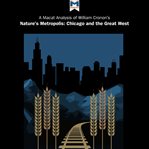Nonfiction
eAudiobook
Details
PUBLISHED
Made available through hoopla
EDITION
DESCRIPTION
1 online resource (1 audio file (1hr., 52 min.)) : digital
ISBN/ISSN
LANGUAGE
NOTES
Read by Macat.com
A winner of the 1992 Bancroft Prize, Nature's Metropolis broke new ground in the burgeoning field of environmental history, while also adding weight to both urban and Western history. Before its publication in 1991, historians generally treated urban and rural areas as distinct from one another, each following separate lines of development and maturity. Using Chicago and its surrounding areas as a model, Cronon's book looks to disprove this idea. It shows how the city-country story really exists as a unified narrative. That is, the city was built on the fruits of its natural surroundings, and those surroundings succeed or fail only in relation to the city. Cronon built his ideas largely on Frederick Jackson Turner's nineteenth-century "frontier thesis," which stressed the effect that taming the wilderness had on the American character. Cronon updates this to argue that capitalist market forces played the major role in changing urban and rural areas together. While some have criticized Cronon for his apparent disdain for human influence in the city-country story, Nature's Metropolis is still an influential book and is particularly lauded by the historical community
Mode of access: World Wide Web







